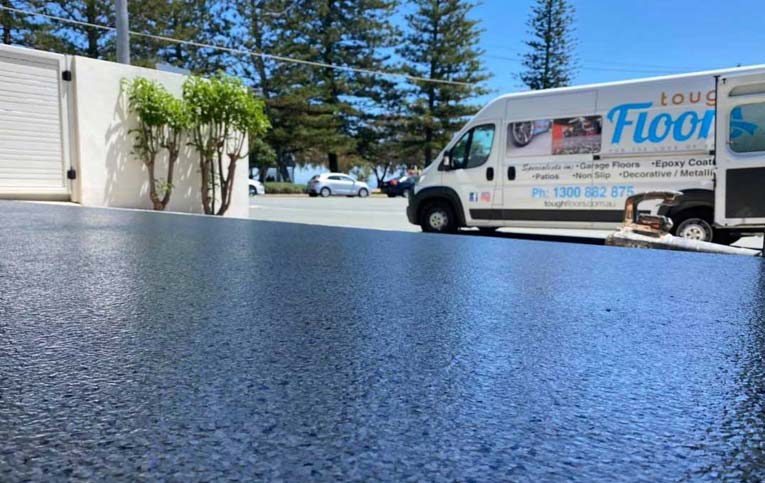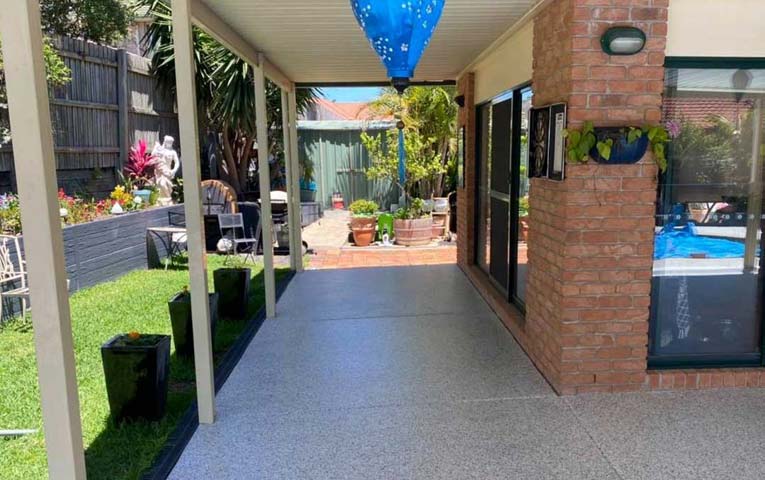Epoxy cure time: How long does epoxy take to cure?

How long does it take for epoxy floors to dry? What epoxy cure time can I expect? Great questions. They’re what every proud garage or commercial premises owner wants answered. The good news is, epoxy cure time is about seven days – that means it takes a week for the final coating to completely harden. Check out our guide to epoxy cure times from Tough Floors Brisbane.
How long does it take for epoxy floors to dry?
Dry times are different. For a coating to dry, this mostly happens overnight.
That being said, not all epoxy coatings are created equal. You could be using water-based epoxy or solvent-borne epoxy (the stuff that smells quite strong), and you could have a higher or lower percentage of solids. The technical data sheets determine factors like dry times, reapplication times, and other basic rules and guidelines.
What epoxy cure time can I expect?
Epoxy cure time is typically seven days. Of course, there are variations, but if you want a rule of thumb, one week is your answer.
While it takes seven days for epoxy to cure, your floor may be dry enough to walk on after 12 hours or so and ready for light use after 24 hours. Be cautious, however, as these timeframes are not applicable to all situations. The colder and less humid an environment, the longer the process.
For example, at a temperature of 25 degrees celcius and 60 per cent humidity, you may be able to return furniture and other items onto your floor in two to three days.
Pro tip: If you are returning furniture onto your newly finished floor before the seven-day mark, understand that, like a new concrete slab, the floor will feel hard and indestructible, but there’s a lot more going on underneath. Always be sure to cover furniture feet to minimise damage. Avoid dragging furniture, too. Lift and place instead.
Finally, if the work is occurring outdoors, the weather forecast and conditions for the time surrounding your planned work needs to be calculated. Your floors require consecutive days of fine weather to dry. If rain is predicted or other conditions are adverse, be patient. Your applicator will provide guidance.
How the product type effects the epoxy cure time
The product itself plays a pivotal role in the epoxy cure time. Many clients believe that if they maximise ventilation by opening all the windows, their new flooring will dry faster – like paint. In some instances, this is true. In others, it’s not. You may actually be better to create a humid environment instead, as many epoxies are ‘moisture-cured,’ meaning they require moisture and heat to dry and harden.
This is why, in hotter climates, we can apply coatings during the times of day in which the concrete is cooling – around mid-afternoon. Coating epoxy to concrete that is warming can cause a host of issues.
How can I speed up the epoxy curing process?
Depending on the epoxy product you are using, you can speed up the epoxy drying time by creating a humid environment, warm environment, or as mentioned with some products, a free flowing ventilated environment.
There are also epoxy products that dry ridiculously fast. They are expensive and sometimes require significant labour numbers to accurately control the application process. These fast-drying epoxies are engineered for areas that need to be open for traffic fast; cold areas like fridges; commercial kitchens; and businesses that cannot close without suffering financial loss.
A speedy return to service probably sounds ideal. However, you can end up with serious problems later on. For instance, say you had a sub-standard concrete slab. On the day of the concrete pour, it was hot and, to give themselves more working time with the concrete, the concreter adds more water than is suggested or appropriate. What this can do is compromise the integrity and overall cured hardness of the concrete, along with rising the ‘fines’ of the concrete to the top.
In the worst case, a fast-drying epoxy-based product just can’t ‘grip’ onto the surface properly, because it needed slower processing times to work effectively.
Most epoxies are made from two components: Part A (resin) and Part B (hardener). These two components need to cross link with each other and the concrete in order to bond to its potential. When the concrete quality has been compromised, combined with the use of a fast-drying product, the result will not be good. Within months, the coating can tear off and need to be re-done.
It’s worthwhile asking yourself: Do I really need to have the work completed so quickly?
Another question I raise is this: who is benefiting the most from faster finished work?
It certainly sounds appealing to know you can have your garage completed in a day, but there’s a quote I like which states: ‘One minute of patience, ten years of peace’ – Greek Proverb.
Chances are, waiting the extra time is worthwhile – and not just for now. Too often, the faster run jobs produce instant results, and the applicator is paid, but then the work fails and the applicator is…well…gone.
Do your homework and view products with a critical eye. Everybody has the ‘best’ products but ultimately, they need to be fit for purpose and that mostly comes from a conversation about YOUR project. A Technical Data Sheet (TDS) will reveal a lot of information, but you almost need a degree or help from a chemist to ascertain what it really means.
How long do I have to wait to epoxy new concrete?
The typical concrete slab requires 28 days before coating – at least. Just round it to a month. Even then, the moisture will need to be tested to ensure the concrete is ready for coating. This is a general rule, so keep in mind the variables at play:
- The thickness of the concrete
- Curing conditions
- Components in the concrete
- What the concrete will be coated with
Moisture is a key culprit that we want out of the slab before an epoxy coating is laid. Slabs may have excess moisture for several reasons, and a moisture vapour treatment or barrier can be applied to counteract it. These prevent moisture from rising within the slab and can withstand huge amounts of water pressure.
If your concrete slab has a coating that completely seals the surface, the water pressure (also called hydrostatic pressure) can build up and rip through epoxy. Investing in moisture treatment can be crucial. In reality, moisture issues represent less than 5% of our work and there are waterproofing specialists that are sometimes required. This is a separate field of expertise, but there are visual signs that we can identify as problematic.
One final word of warning
What might be an appropriate use of a product in Melbourne won’t necessarily be suitable for epoxy application on the Gold Coast. Understand the limitations if you’re willing to research but ask questions. Lots of questions.
Much of what is used in the industry is imported, relabelled, and sold to epoxy applicators like us. Epoxy warranty information and support on these products can often be close to non-existent, as few people really know what’s in the tin, how it should be applied, and what to do if something goes wrong.
The moral of the story: choose your applicator wisely and don’t rush the process.
Get a fast, accurate quote
Ready to transform your outdoor space, garage, or commercial premises with epoxy flooring? Get in contact with the friendly and reliable team at Tough Floors. We are genuine industry experts, and we’re here to supply you with a fast and accurate quote. Call now on 1300 882 875 .


